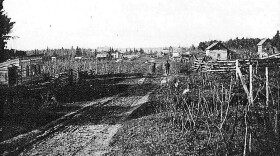American Indian Services, an organization that has served the Native American community in Southeast Michigan for nearly 50 years, is closing its doors this week. Since 2014, the organization has seen its budget reduced by 67 percent.
Fay Givens is the executive director of American Indian Services. She says that COVID-19 related budget cuts were the last straw. “We’re so underfunded anyways that we could not bear one more cut.”
She says the people they serve have expressed their unhappiness with the situation, and they’ve had people come to the building in tears.
“It’s been really emotionally very hard to deal with, because there’s really no other place for them to go now, we were the end of the line, and now their support system is gone.”
American Indian Services, located in the Lincoln Park neighborhood of Detroit, provided Southeast Michigan’s Native American community with a wide variety of services, including mental health counseling, trauma therapy, after-school and summer youth programs, and a food distribution program that Givens says fed 6000 people.
She says they’ve referred their clients to other organizations in the community for this wide variety of needs, including Community Care Services, which is just blocks away from American Indian Services.
“But they don’t specialize in Native treatment of any kind, so we’re hoping that they will go, and that they will get acclimated to a new way of doing things, but we’re not at all sure that they will.”
Givens says the mistrust of what she calls “mainstream agencies” comes from the history of these agencies taking Native American families from their children and putting them in boarding schools (a source of trauma their counseling services sought to address).
Another huge problem with alternate organizations is accessibility. Givens says it's going to be difficult for many of their clients to go elsewhere because they don’t have cars, and American Indian Services is highly walkable.
“We have 269 American Indian families in Lincoln Park, and most of them walk over to get their food, or bring their wagons or little carts. We’re right in the neighborhood. We don’t know where they’ll go or where they’ll be able to go.”






